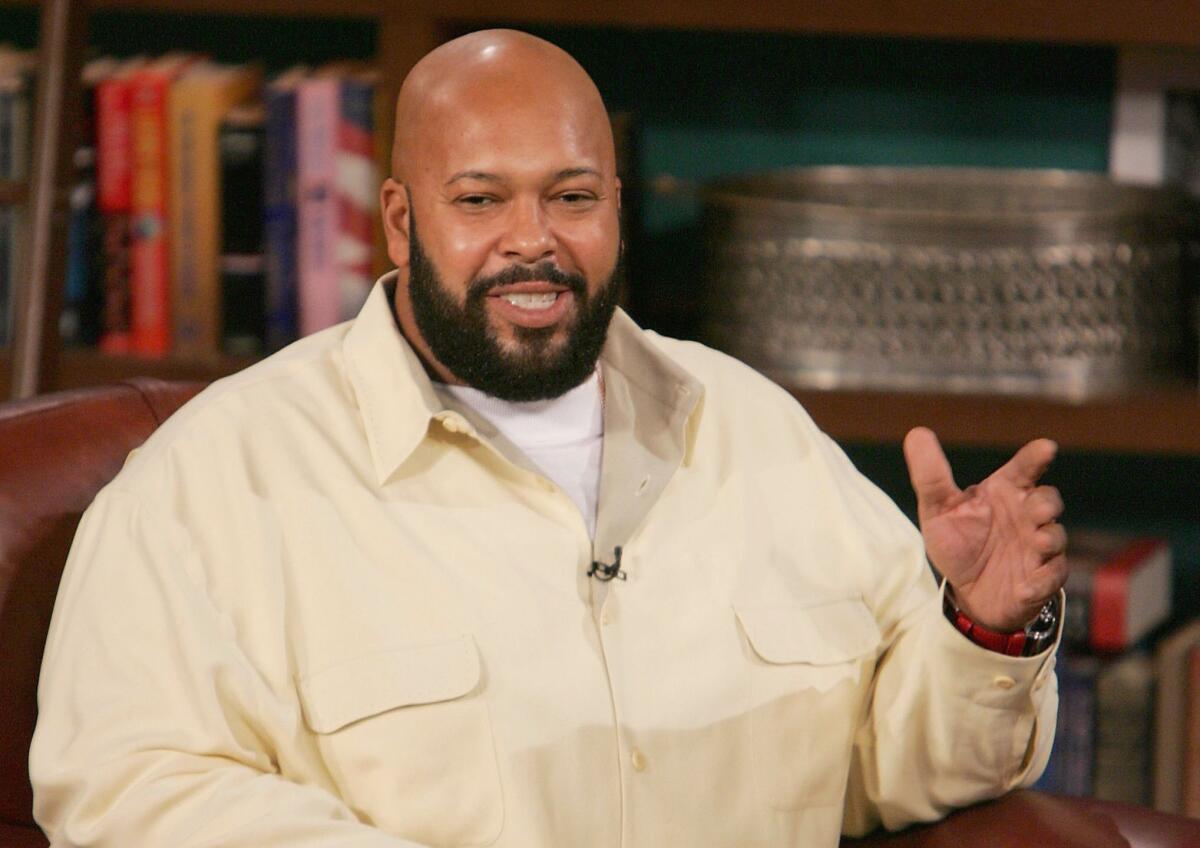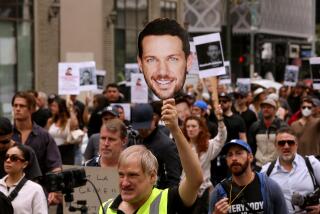Chris Brown party shooting: Another chapter in the life of Suge Knight

When music impresario Marion “Suge” Knight and two others were wounded early Sunday at a pre-MTV Video Music Awards party for Chris Brown in West Hollywood, the shooting became the latest ripple in Knight’s imprint on the music world.
The Death Row Records founder and the two others were expected to survive the shooting at the hot spot 1Oak, the Los Angeles County Sheriff’s Department said.
R&B star Brown, who was celebrating his upcoming album “X,” performed at the club before the shooting. Partygoers posted videos on Twitter and Instagram of not only Brown but also the post-shooting chaos, during which partygoers could be seen ducking and screaming.
“It’s disappointing that we as a society can’t have fun or enjoy ourselves without any altercations sometimes,” Brown tweeted early Sunday morning.
The event at 1Oak, a nightclub in the 9000 block of Sunset Boulevard, was the second pre-VMA party Brown hosted Saturday night. An earlier party at a Beverly Hills estate packed in celebrities including Justin Bieber, Kendall and Kylie Jenner, Busta Rhymes, Ludacris and Game -- and went off without incident.
Both events took advantage of the influx of industry heavyweights in town for the MTV Video Music Awards on Sunday night at the Forum in Inglewood. Neither of Brown’s parties was officially tied to MTV, a representative for the network said Sunday.
The shooting appeared to have no effect on the planning of the awards show, but they did highlight Knight’s history of trouble.
When a career in the NFL didn’t pan out (he was a replacement player during the 1987 strike), he put his formidable build to good use as a bodyguard for celebrities including Bobby Brown. He eventually began promoting concerts and launched a music publishing business.
Knight gained notoriety when he muscled Vanilla Ice over rights to his smash “Ice Ice Baby.” Vanilla Ice publicly detailed his run-ins, most infamously accusing Knight of dangling him by the ankles from the 15th floor balcony of the Bel Age hotel in West Hollywood.
That reputation for a by-any-means-necessary street mentality fueled most of Knight’s business dealings, including the launch of Death Row Records in the early 1990s. He co-founded the label with Dr. Dre after getting the former NWA member out of his deal with Eazy-E’s Ruthless Records. (In that case, legend has it that Knight and his henchmen used lead pipes and baseball bats as intimidation.)
Death Row found almost instant success. Dr. Dre’s debut, 1992’s “The Chronic,” was a hit. The album became a blueprint of sorts for West Coast gangsta rap, and his production style of incorporating slow hypnotic grooves, soulful vocals and heavy samples of Parliament and Funkadelic birthed the G-funk subgenre. Snoop Dogg’s equally influential debut, “Doggystyle,” arrived shortly thereafter, boasting Dre’s production.
Death Row found success with West Coast rappers and singers including Lady of Rage, Michel’le, DJ Quik, Nate Dogg and Tha Dogg Pound. But professional success didn’t keep Knight out of controversy.
His thirst for fame, reputation for intimidation and penchant for surrounding himself with henchmen -- gang members were mainstays -- alienated his acts. Dr. Dre famously departed in 1996 to launch his Aftermath Entertainment imprint (Eminem, 50 Cent, Game, Kendrick Lamar).
Knight feuded with 2 Live Crew and faced activists such as C. Delores Tucker, who launched a campaign against the violent and sexually explicit lyrics that heavily peppered Death Row releases.
By the end of 1995, Tupac Shakur had accused Sean “Puffy” Combs and Combs’ Bad Boy Records flagship act Notorious B.I.G. of setting him up to be robbed and shot in a 1994 attack at a New York studio.
In 1996, Shakur was shot and killed in Las Vegas as he rode in a car driven by Knight. Industry rumors placed the blame on Bad Boy. Six months later, while in L.A. for the 1997 Soul Train Awards,Notorious B.I.G. was gunned down after leaving a party. Both slayings remain unsolved.
When Knight was sentenced in 1997 to nine years in prison for violating the terms of his probation from an assault case, his control of the label diminished. Snoop Dogg and other acts departed.
While behind bars he tried to salvage what was left of his imprint. Knight signed new acts, most notably TLC’s Left Eye under a pseudonym, and campaigned against former Death Row acts such as Snoop. Left Eye died before she could release her Death Row debut.
Knight was released from prison in 2001 after serving less than five years, but he was never able to restore the label to its former prominence, and his own legal troubles piled up. In 2009 the label was auctioned for a reported $18 million.
More to Read
The biggest entertainment stories
Get our big stories about Hollywood, film, television, music, arts, culture and more right in your inbox as soon as they publish.
You may occasionally receive promotional content from the Los Angeles Times.










